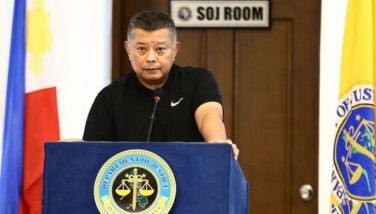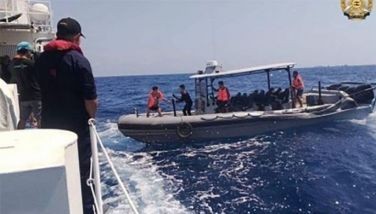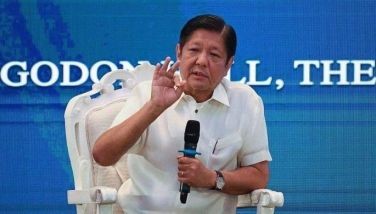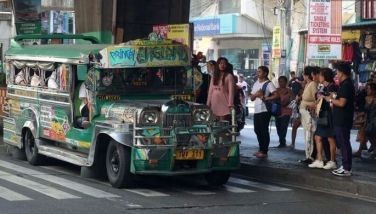2005 kidnap cases higher than in 2004
January 3, 2006 | 12:00am
Anti-crime watchdog groups have reported a 37-percent resurgence of kidnappings-for-ransom last year, from 46 reported cases in 2004 to 63 in 2005.
Ransom paid to kidnappers last year also rose; totaling P54.1 million last year, up from P41.39 million recorded in 2004, according to Tulay, a fortnightly publication of Kaisa para sa Kaunlaran, a Chinese-Filipino organization.
The number of cases last year is still the second lowest since 1993, when anti-crime groups began monitoring the kidnapping scourge.
The highest number of reported cases was 152 in 1997.
"There are other bright spots in the anti-kidnapping campaign. Many key players, including police officers, in kidnap-for-ransom activities were neutralized in 2005," Tulay reported. "Their trial is expected to be long and contentious as is often the case when victims discover that their abductors are active-duty police officers."
Among the most high-profile suspects is former actor and former Quezon City congressman Dennis Roldan. He and six others are accused of masterminding the Feb. 9 abduction of three-year-old boy Kenshi Yu.
Most of the suspects in the seven kidnapping cases decided by the courts last year were meted the death sentence.
There have been no executions, however, ever since the Arroyo administration put executions on hold in 2004 because of the still-raging debate over capital punishment.
Last year also saw the reorganization of the National Anti-Kidnapping Task Force to the National Anti-Crime Task Force with Interior Secretary Angelo Reyes as its head.
Tulay also noted the arrest or killing of several most wanted kidnap suspects, who carried bounties ranging from P500,000 to P1 million.
Topping the list are members of the Ilonggo Waray-Waray kidnap gang, which was behind at least 20 kidnap cases.
Among them was gang member Renato Superable, who was allegedly responsible for the two gunshots that killed Coca-Cola finance executive Betti Chua-Sy in November 2003. The incident sparked a nationwide outrage that prompted a government crackdown and put the Arroyo administration’s determination to curb crime in question.
Other kidnap suspects neutralized by law enforcement agencies were:
• Nov. 23: Police arrested Cesar Amado, the 20th suspect in the kidnap-slaying of Chua-Sy, whose body was found wrapped in a plastic garbage bag on Diosdado Macapagal Avenue in Parañaque on Nov. 17, 2003. Amado was also linked to the abduction of Victor Castañeda, Dr. Patrick Padilla, Dr. Margaret Dy, San Ik Jiang, Alfredo Chan, Franklin Ongsito, Jose Naga, all in 2003; and Antonio Tan, Imelda Bengson, Augusto Tony Manikis and Dr. Susan Nodado, in 2002.
• Nov. 9: Aljon Martinez, the country’s seventh most wanted criminal who had a P500,000 bounty on his head, was killed in an encounter with police in Las Piñas City.
• Sept. 23: Police arrested Hector Cornista, Domingo Cornista, Alvin Cornista, Renato Superable, and Rogelio Mendoza, Superable’s two cousins, JunJun and Silverio, all of whom admitted responsibility for 17 kidnap-for-ransom cases, including Chua-Sy’s. Silverio, the 3rd most wanted kidnaper with an P800,000 prize on his head, was arrested Feb. 17 by the Special Operations Group and intelligence unit of the regional police in Leyte.
• Sept. 13: Norham Ali, also known as "Commander Ramsey," a leader of the Pentagon kidnap-for-ransom gang, was arrested in Zamboanga del Sur. Ali, one of the most wanted fugitives in the country with a P500,000 bounty, is believed to have been behind the abduction of Italian priest Giuseppe Pierantoni from his convent in Zamboanga del Sur, and of five Chinese engineers in 2001.
• July 17: Officers of the Quezon and Batangas police arrested Efren Anido, alleged member of the dreaded Moog kidnap-for-ransom gang. Anido was one of the most wanted persons of the National Anti-Kidnapping Task Force and had a P500,000 bounty on his head.
• May 8: Cavite policemen arrested Christopher Simbahan, suspected member of the Batangas-based Simbahan kidnap-for-ransom gang.
• Feb. 8: Police arrested Ronald Amantiad Ruelan, who carried a P500,000 bounty and is accused of kidnapping Elizabeth Josephine Puyat in Manila in 2002.
• Feb. 5: Military and police intelligence agents arrested Aminula Jimlani, alleged ranking leader of the Abu Sayyaf extremist group in Zamboanga. Jimlani, who had a P1 million bounty, was among the bandits who seized Americans Guillermo Sobero, missionary couple Martin and Gracia Burnham and 17 local tourists and beach resort personnel in Palawan in 2001.
• Jan. 6: The country’s ninth most wanted kidnaper, Emerson Alzate, was arrested by the Police Anti-Crime and Emergency Response in Pasig City. Alzate carried a P600,000 bounty for his capture and was wanted for kidnaping Lorenza Verganilla in 2004.
The Philippines has suffered from an image of being unsafe to tourists and investors due to a rash of kidnapping-for-ransom cases and drug-related crimes. Less than two million tourists visit the country each year.
In many instances, the police are perceived as being protectors of crime gangs.
Kidnap gangs often prey on Chinese-Filipinos, who are perceived to be wealthier and less likely to report incidents to the police.
Under pressure from the Chinese-Filipino community, Mrs. Arroyo in December 2003 lifted a year-long moratorium on executions in a bid to reverse a rising crime wave.
Her decision, however, drew criticism from anti-death penalty advocates, including the Roman Catholic Church, accusing her of playing to the gallery. She later changed her mind.
Apart from the crime gangs, government security forces have been going after the Abu Sayyaf.
The Abu Sayyaf is a small group of al-Qaeda linked Islamic militants responsible for a string of kidnappings of foreigners in Mindanao, including three Americans in 2001. Two of the Americans were killed.
Washington considers the Abu Sayyaf a terrorist organization.
In her 2002 State of the Nation Address, Mrs. Arroyo vowed to crush kidnap gangs as part of her pledge to build a "strong republic."
She acknowledged that kidnappings were scaring off potential businessmen and investors.
She branded terrorism and crime as "enemies of the state," saying lawlessness — particularly, kidnapping, illegal drugs and terrorism — were threatening national security and undermining the country’s economic recovery efforts.
Mrs. Arroyo formed the National Anti-Kidnapping Task Force and ordered "military-style" police operations in hunting down kidnap gangs.
The death penalty, abolished in the Constitution ratified in 1987, was restored in 1994 for heinous crimes such as rape, kidnapping-for-ransom, murder and drug trafficking.
Seven convicts were executed in 1999, but President Joseph Estrada ordered an indefinite freeze following pressure from human rights groups and the Catholic Church. — Courtesy of Tulay/ Kaisa Para sa Kaunlaran Inc.
Ransom paid to kidnappers last year also rose; totaling P54.1 million last year, up from P41.39 million recorded in 2004, according to Tulay, a fortnightly publication of Kaisa para sa Kaunlaran, a Chinese-Filipino organization.
The number of cases last year is still the second lowest since 1993, when anti-crime groups began monitoring the kidnapping scourge.
The highest number of reported cases was 152 in 1997.
"There are other bright spots in the anti-kidnapping campaign. Many key players, including police officers, in kidnap-for-ransom activities were neutralized in 2005," Tulay reported. "Their trial is expected to be long and contentious as is often the case when victims discover that their abductors are active-duty police officers."
Among the most high-profile suspects is former actor and former Quezon City congressman Dennis Roldan. He and six others are accused of masterminding the Feb. 9 abduction of three-year-old boy Kenshi Yu.
Most of the suspects in the seven kidnapping cases decided by the courts last year were meted the death sentence.
There have been no executions, however, ever since the Arroyo administration put executions on hold in 2004 because of the still-raging debate over capital punishment.
Last year also saw the reorganization of the National Anti-Kidnapping Task Force to the National Anti-Crime Task Force with Interior Secretary Angelo Reyes as its head.
Tulay also noted the arrest or killing of several most wanted kidnap suspects, who carried bounties ranging from P500,000 to P1 million.
Topping the list are members of the Ilonggo Waray-Waray kidnap gang, which was behind at least 20 kidnap cases.
Among them was gang member Renato Superable, who was allegedly responsible for the two gunshots that killed Coca-Cola finance executive Betti Chua-Sy in November 2003. The incident sparked a nationwide outrage that prompted a government crackdown and put the Arroyo administration’s determination to curb crime in question.
Other kidnap suspects neutralized by law enforcement agencies were:
• Nov. 23: Police arrested Cesar Amado, the 20th suspect in the kidnap-slaying of Chua-Sy, whose body was found wrapped in a plastic garbage bag on Diosdado Macapagal Avenue in Parañaque on Nov. 17, 2003. Amado was also linked to the abduction of Victor Castañeda, Dr. Patrick Padilla, Dr. Margaret Dy, San Ik Jiang, Alfredo Chan, Franklin Ongsito, Jose Naga, all in 2003; and Antonio Tan, Imelda Bengson, Augusto Tony Manikis and Dr. Susan Nodado, in 2002.
• Nov. 9: Aljon Martinez, the country’s seventh most wanted criminal who had a P500,000 bounty on his head, was killed in an encounter with police in Las Piñas City.
• Sept. 23: Police arrested Hector Cornista, Domingo Cornista, Alvin Cornista, Renato Superable, and Rogelio Mendoza, Superable’s two cousins, JunJun and Silverio, all of whom admitted responsibility for 17 kidnap-for-ransom cases, including Chua-Sy’s. Silverio, the 3rd most wanted kidnaper with an P800,000 prize on his head, was arrested Feb. 17 by the Special Operations Group and intelligence unit of the regional police in Leyte.
• Sept. 13: Norham Ali, also known as "Commander Ramsey," a leader of the Pentagon kidnap-for-ransom gang, was arrested in Zamboanga del Sur. Ali, one of the most wanted fugitives in the country with a P500,000 bounty, is believed to have been behind the abduction of Italian priest Giuseppe Pierantoni from his convent in Zamboanga del Sur, and of five Chinese engineers in 2001.
• July 17: Officers of the Quezon and Batangas police arrested Efren Anido, alleged member of the dreaded Moog kidnap-for-ransom gang. Anido was one of the most wanted persons of the National Anti-Kidnapping Task Force and had a P500,000 bounty on his head.
• May 8: Cavite policemen arrested Christopher Simbahan, suspected member of the Batangas-based Simbahan kidnap-for-ransom gang.
• Feb. 8: Police arrested Ronald Amantiad Ruelan, who carried a P500,000 bounty and is accused of kidnapping Elizabeth Josephine Puyat in Manila in 2002.
• Feb. 5: Military and police intelligence agents arrested Aminula Jimlani, alleged ranking leader of the Abu Sayyaf extremist group in Zamboanga. Jimlani, who had a P1 million bounty, was among the bandits who seized Americans Guillermo Sobero, missionary couple Martin and Gracia Burnham and 17 local tourists and beach resort personnel in Palawan in 2001.
• Jan. 6: The country’s ninth most wanted kidnaper, Emerson Alzate, was arrested by the Police Anti-Crime and Emergency Response in Pasig City. Alzate carried a P600,000 bounty for his capture and was wanted for kidnaping Lorenza Verganilla in 2004.
The Philippines has suffered from an image of being unsafe to tourists and investors due to a rash of kidnapping-for-ransom cases and drug-related crimes. Less than two million tourists visit the country each year.
In many instances, the police are perceived as being protectors of crime gangs.
Kidnap gangs often prey on Chinese-Filipinos, who are perceived to be wealthier and less likely to report incidents to the police.
Under pressure from the Chinese-Filipino community, Mrs. Arroyo in December 2003 lifted a year-long moratorium on executions in a bid to reverse a rising crime wave.
Her decision, however, drew criticism from anti-death penalty advocates, including the Roman Catholic Church, accusing her of playing to the gallery. She later changed her mind.
Apart from the crime gangs, government security forces have been going after the Abu Sayyaf.
The Abu Sayyaf is a small group of al-Qaeda linked Islamic militants responsible for a string of kidnappings of foreigners in Mindanao, including three Americans in 2001. Two of the Americans were killed.
Washington considers the Abu Sayyaf a terrorist organization.
In her 2002 State of the Nation Address, Mrs. Arroyo vowed to crush kidnap gangs as part of her pledge to build a "strong republic."
She acknowledged that kidnappings were scaring off potential businessmen and investors.
She branded terrorism and crime as "enemies of the state," saying lawlessness — particularly, kidnapping, illegal drugs and terrorism — were threatening national security and undermining the country’s economic recovery efforts.
Mrs. Arroyo formed the National Anti-Kidnapping Task Force and ordered "military-style" police operations in hunting down kidnap gangs.
The death penalty, abolished in the Constitution ratified in 1987, was restored in 1994 for heinous crimes such as rape, kidnapping-for-ransom, murder and drug trafficking.
Seven convicts were executed in 1999, but President Joseph Estrada ordered an indefinite freeze following pressure from human rights groups and the Catholic Church. — Courtesy of Tulay/ Kaisa Para sa Kaunlaran Inc.
BrandSpace Articles
<
>
- Latest
- Trending
Trending
Latest
Trending
Latest
Recommended































